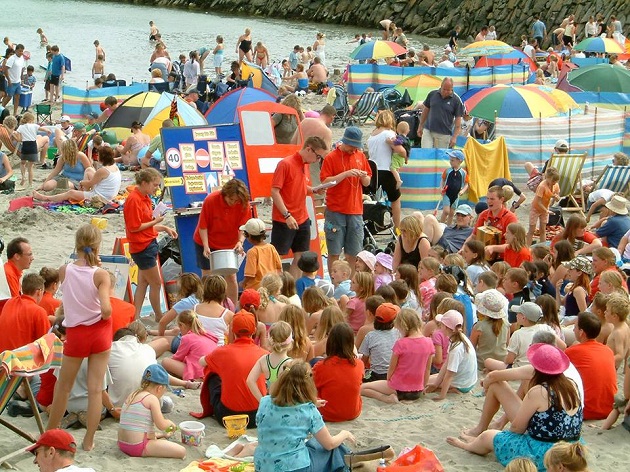Out in the open, a beach mission is like a church without walls. Those who are unsure can sit at a distance, listening and looking. There is something too about the anonymity of being away on holiday that makes people more willing to try new things.
 Photo: United Beach Missions
Photo: United Beach Missions
God is love. This short sentence is a great truth of the Bible: a simple and easily understood message. In 1868, it was these three words, written in the sand by a young man on holiday in Llandudno that led to the remarkable work that has spread across the world to so many places where there is sand and sea: the beach mission.
When Josiah Spiers, a Victorian clerk from London, ‘ran to a nearby shop to buy pegs and string’ with which he marked out the text for the children on the beach to fill with shells, stones and seaweed, he was simply creating a way to tell them about the love of God shown in Jesus. He would never have imagined that 150 years later Christians would still be doing the same – though often with far more equipment than a handful of pegs and a ball of string!
Once the text was finished the children asked for a story, so Spiers told them one, and then another and another. He did the same for the next three days, and when the town crier announced that a service would be held on the beach on Sunday afternoon, three to four hundred children and adults came to listen to Spiers.
Children’s Special Service Mission
Spiers and his friend T. B. Bishop had already been running special services for children in Islington, London, and his actions on Llandudno beach arose from his increasing awareness of the response that a child could make if the truths of the gospel were presented in the right way. This new work on the beaches quickly became a hallmark of the Children’s Special Service Mission (CSSM), now known as Scripture Union.
A year later, thanks to a legacy, Spiers resigned from his paid role and instead worked for the CSSM as an evangelist. He led services on the beach at Margate, Brighton and in Llandudno again that year, and by the mid-1880s there were seaside missions in around fifty resorts.
Beach missions
Fast forward 150 years, and now beach missions are being run around Britain and the world by Scripture Union as well as by United Beach Missions, local churches and other Christian groups. Though the methodology has changed, the message remains the same, and the need for children to hear these truths is even greater than in Victorian days. Research suggests that around 95% of children are not in church, so going to ‘where children are, but the gospel isn’t’, as Scripture Union puts it, means that the beach mission still has an important role to play in our modern day society.
A church without walls
Out in the open, a beach mission is like a church without walls. Those who are unsure can sit at a distance, listening and looking but not actively involved. In time they may be drawn in by what’s happening, yet still have freedom to walk away easily if they feel less sure. It can be like a tasting menu in a restaurant, giving a family chance to see what they think – though children often leap in enthusiastically without waiting to see if their parents are as eager! There is something too about the anonymity of being away on holiday, where nobody knows what you normally believe, and of being more relaxed, with fewer calls on time, that softens people’s attitudes and makes them more willing to try new things.
Welcoming people, using everyday language to explain the good news of Jesus and the Bible, fun and laughter, play and friendship, are the ‘pegs and string’ of today’s beach missions, as teams do all they can to tell and to show that God is love just as Josiah Spiers did 150 years ago.
Helen Franklin is a development worker for Scripture Union Cymru.
This article first appeared in the Evangelical Magazine published by the Evangelical Movement of Wales and is used with permission.

Las opiniones vertidas por nuestros colaboradores se realizan a nivel personal, pudiendo coincidir o no con la postura de la dirección de Protestante Digital.
Si quieres comentar o